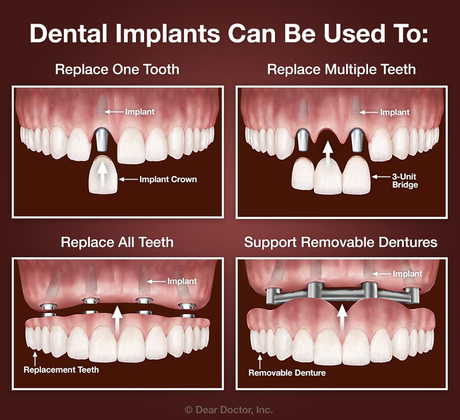Our Dental Sense Ideas
Table of ContentsThe Greatest Guide To Dental SenseNot known Facts About Dental SenseDental Sense Fundamentals ExplainedIndicators on Dental Sense You Need To Know
are medical tools surgically implanted right into the jaw to restore a person's capacity to chew or their look. They give support for fabricated (phony) teeth, such as crowns, bridges, or dentures. When a tooth is shed because of injury or disease, an individual can experience issues such as fast bone loss, defective speech, or modifications to eating patterns that lead to discomfort.Dental implant systems contain a dental implant body and oral implant joint and might also consist of an abutment fixation screw. Cosmetic dentistry services. The dental implant body is surgically put in the jawbone in area of the tooth's root. The dental implant abutment is usually connected to the implant body by the joint fixation screw and prolongs via gums right into the mouth to support the connected man-made teeth
(https://dentalsense1.weebly.com/)Structure of The Dental Implant System picking oral implants, talk to your dental supplier concerning the possible advantages and threats, and whether you are a candidate for the treatment. Points to think about: Your total health and wellness is an essential factor in determining whether you are an excellent candidate for oral implants, for how long it will require to recover, and the length of time the implant might remain in place.
Cigarette smoking might influence the healing process and lower the lasting success of the implant. The recovery procedure for the implant body may take a number of months or longer, during which time you normally have a short-lived joint in area of the tooth. the oral implant treatment: Carefully follow the oral hygiene instructions provided to you by your oral company.
Examine This Report on Dental Sense
Implant failure can lead to the demand for another surgery to repair or change the dental implant system. Brings back the ability to eat Restores aesthetic look Aids maintain the jawbone from reducing because of bone loss Preserves the health and wellness of the surrounding bone and periodontals Helps maintain surrounding (nearby) teeth steady Enhances lifestyle Damage to surrounding all-natural teeth throughout dental implant positioning Injury to the surrounding cells throughout surgical treatment, such as sinus opening Injury during surgical treatment (for instance, crack of surrounding jawbone) Insufficient feature, such as feeling like the teeth do not attack with each other typically An experience that the tooth is loose or twisting in place arising from an abutment screw loosening up Implant body failing (looseness of the dental implant body) as a result of systemic infection, which might be most likely in clients with unrestrained diabetes as a result of neighborhood infection in bone and periodontals sustaining the dental implant body due to postponed recovery, which may be most likely in clients that smoke Trouble cleaning the gum tissues around the implant, resulting in bad dental hygiene Unattended periodontal condition Post-surgical feeling numb as a result of nerve impingement or damages Constantly alert health care suppliers and imaging technicians that you have oral implants before any magnetic resonance imaging (MRI) or x-ray treatments.
FDA is not familiar with any kind of adverse events reported for MRI or x-ray procedures with dental implants. Dental implants systems are commonly made from products that comply with worldwide agreement criteria of the International Organization for Standardization (ISO) or ASTM International. These criteria have information of what makes a safe product.

An oral implant is a framework that changes a missing tooth. With screw-like gadgets, the surgeon inserts a dental implant right into the jawbone, and it acts as a support for a synthetic tooth, called a crown.
Our Dental Sense Diaries
Some people are not qualified for dental implant surgery. It is for dental doctors to operate people with: acute illnessuncontrollable metabolic diseasebone or soft cells illness or infectionIf these concerns are dealt with, a person can have the surgical treatment. In, dental cosmetic surgeons avoid operating on individuals with: If people with any of the above undergo dental implant surgical procedure, there is a higher threat of the implant falling short.

Oral dental implant surgical treatment is an individualized process. Offer you time to recover. Attach the article and final crown, bridge or denture.
Next, your surgeon will carefully place the dental implant into your jaw. If your dental implant is near the front of your mouth, your dental expert will make a momentary tooth for you to wear till you recover.
Our Dental Sense Statements
Your provider can tell you what to expect in your situation. Throughout the recovery stage, your jawbone ought to fuse to the dental implant. This procedure, called osseointegration, is crucial for stability and long-term success. This process can take anywhere from three to nine months. In many cases, it may take visit homepage longer.
As soon as your implant heals, your dental professional can affix the joint (little port blog post) and your final remediation (crown, bridge or denture). This normally takes about one hour to finish and might require a second small surgery. You shouldn't really feel any kind of discomfort during your oral implant treatment because your copyright will utilize drug to numb your gums.